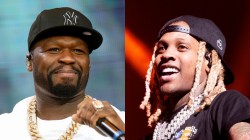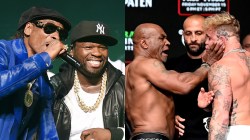Consider the landscape of 2000 when Eminem released The Marshall Mathers LP — the peak of CD buying and music consumption; MTV still had a large corner of the pop culture market with TRL and every September, the Video Music Awards.
With 1999’s The Slim Shady LP, Em proudly announced himself to the general public as a foul-mouthed, colorful shock rapper from Detroit who could turn a phrase. At the same time, he angered his direct family, conservatives, human rights organizations such as GLAAD and numerous critics. Marshall Mathers had become an anti-hero. A year later, he was the hottest rapper in the world, a heat magnet for any group willing to protest him and villain for the wife of a future Vice President.
To understand the moment, here are a few facts to help crystalize why Eminem, in 2000, was as big a supernova as pop culture and music ever saw.
The Biggest Hip Hop Sales Week – Ever
The 1.76 million copies it sold in its opening frame is the most ever for a rap album, more than doubling the previous record-holder — Snoop Dogg’s Doggystyle in 1993. MMLP was such a sales juggernaut that it sold over half a million copies for four consecutive weeks. No album has come close to it from a rap standpoint and probably won’t given the current streaming climate. Worldwide? It sold over 35 million copies, quickly becoming one of the biggest Hip Hop albums, ever.

AD LOADING...
MMLP Added To The English Language
Arguably the best song on the album “Stan” is a near-seven minute odyssey about one Eminem fan who took his lyrics to an obsessive and ultimately fatal point. The obsessive concept, where fandom become whole identities for some people eventually made “stan” a term that landed in the Oxford Dictionary in 2017. It was later added to the Merriam-Webster dictionary in April 2019.
Steve Berman Is An Actual Person
Anyone familiar with any Eminem album since MMLP knows Steve Berman is a familiar character who pops in from time to time. The first appearance of Berman comes just before “The Way I Am,” Em’s shot at Interscope after being frustrated they thought he didn’t have a “hit” for this album.

AD LOADING...
For the first decade of major label Em releases, Berman was used as the physical representation of Interscope, culminating with Em shooting him on The Eminem Show. The two patched things up by Relapse but even then, Berman wasn’t looking forward to seeing Em. Berman was the actual President of Sales and Marketing at Interscope Records at the time and has been there since 1991. He’s now Vice Chairman of the label.
The Album Was Almost Titled Amsterdam
The crux of MMLP came during a promotional world tour and stop in the Netherlands. Planted in a city that made Las Vegas excess appeal as tame as apple pie, Em saw everyone doing and felt at home. “Everyone doing drugs — all the time, everywhere,” he said.
Once the pressures of actual life kicked in (a $10 million defamation lawsuit from his mother Debbie, his absentee father returning like Will Smith’s dad on The Fresh Prince), all the angst of America drowned out the liberation of Amsterdam.

AD LOADING...
“Kim” Was Too Explicit To Be Censored
The most controversial song on MMLP (a shock considering what it’s stacked up against) is “Kim.” The song, featuring Em outright murdering his ex-wife, is a direct sequel to “’97 Bonnie & Clyde” from The Slim Shady LP. Instead of even attempting to censor the song for the clean version of the album, it was ultimately replaced by “The Kids,” a juvenile PSA from Em in the vein of a South Park character warning a class about ecstasy and reefer madness.
Marshall Mathers couldn’t figure out why he, a bleached-blond rapper who had cut his teeth rhyming with practically everybody for years had become the biggest star in the world. He used people such as Lynne Cheney to make his lyrics become part of Congressional record on the Senate floor because she had deemed him the worst thing to America. During a September 2000 Congressional, Cheney, the wife of then-Vice Presidential candidate Dick Cheney, determined him to be “despicable and shameful” and used the lyrics of “Kill You” as her biggest example. For the middle of the country and beyond, Em represented an untapped voice, one that managed to merge the rock aspects of The Warped Tour along with Hip Hop’s Up In Smoke Tour. To them, he was their introduction to “real” Hip Hop.
In the years since The Marshall Mathers LP, Eminem’s cultural impact continued to grow. By 2003, he was an Oscar winner and considered the most popular rapper in the world. Through it all, Em never stopped trying to provoke a response out of people.

AD LOADING...
In the one year where it all came together, he created a cultural time capsule into fame, anger and identity. That’s the biggest legacy of The Marshall Mathers LP, it made Eminem the avatar for an entire generation of Hip Hop fans.




